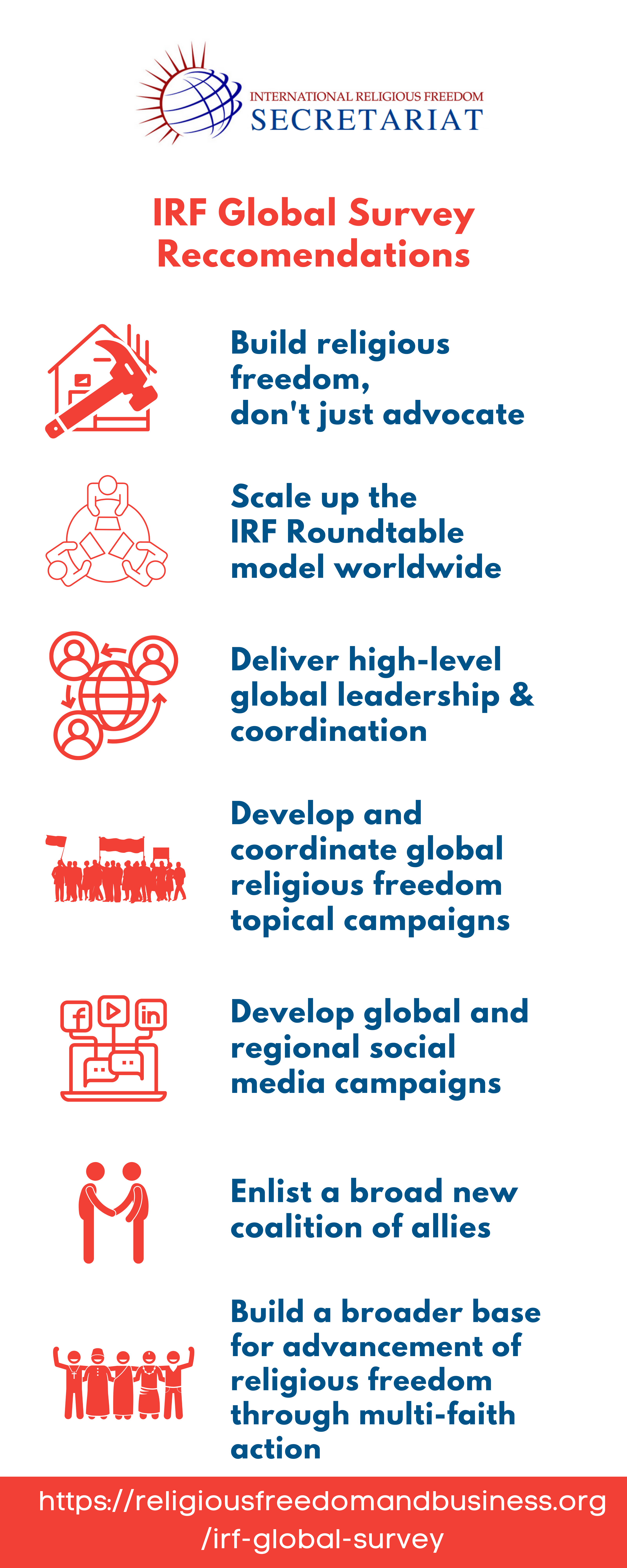IRF Global Survey
New Directions: Global Opportunities for Expanding and Coordinating Religious Freedom Initiatives
Research report of religious freedom leaders and friends from around the world, IRF Secretariat
IRF Summit 2021 – Washington, D.C.
Expanding freedom of religion or belief (FORB) globally will need to rely on new directions, according to a new study conducted by the IRF Secretariat in collaboration with the Religious Freedom & Business Foundation. The study includes data from ten focus groups and a global survey of more than 200 respondents representing points of view for 50 countries making up nearly three-quarters of the world’s population.
The global movement to advance religious freedom for everyone, everywhere, all the time will need to rely on new directions, according to a study conducted by IRF Secretariat among faith leaders, religious freedom advocates, experts, academics, NGO leaders, and governmental representatives.
The study includes data from ten focus groups. Many themes emerged, including the need to advance religious freedom advocacy and cooperative engagement alongside and within existing social institutions, such as business. Also, the importance of humanizing ”religious freedom” was routinely mentioned: a greater human experience allows for wider solidarity across faith groups and other human rights organizations, and is effective in expanding religious freedom when multiple groups are involved. Finally, focus group participants concurred with the call for greater social responsibility in expanding religious freedom, potentially leading to new civil society plans.
A survey of more than 200 respondents representing points of view for 50 countries that make up nearly three-quarters of the world’s population showed a similar pattern of findings. There is broad agreement in the potential impact of advancing religious freedom through economic initiatives within business and among business leaders. Survey respondents, in most regions around the world, also say that more active religious freedom work among businesses could lead to less youth radicalization and greater social harmony.
Most survey respondents also indicated that religious rights are human rights, and that there are intersectional opportunities with other human rights issues, such as economic disadvantage, LGBTQ+ rights, women’s rights, and freedom of the press to address religious freedom. Although solid majorities feel that the promotion of LGBTQ+ rights have an adverse effect on the promotion of religious freedom, 89% of U.S. respondents say it would be somewhat or very acceptable to find common ground with the LGBTQ+ community to advance religious freedom. Respondents, however, indicated that public alignment with some human rights groups may not always be beneficial for expanding religious freedom in their countries. It seems that multiple tracks — bridge building, humanitarian approaches, and educational plans — all working together is a possible direction going forward.
Finally, survey respondents are keen on new civil society plans, particularly in starting religious freedom roundtables in their countries, an opportunity to bring faith, business, and human rights leaders into regular discussions and joint action to better advance religious freedom. Most respondents indicated they and/or their organizations would be available to assist in the development of such roundtables. And, most said a global network of roundtables would be helpful in this pursuit. The majority of survey respondents also thought a global social media campaign indirectly supporting religious freedom would be useful.
The report presents global findings for each of the three areas listed above: (1) economic initiatives, (2) intersectional opportunities, and (3) new civil society plans. Findings for world regions and differing levels of government restrictions on religion and social hostilities involving religion are also presented. The report presents key findings for six world regions, divided across the Global North and the Global South. It concludes with a list of recommendations based on the findings of this study.
Recommendations
Advancing international religious freedom for everyone, everywhere, all the time will need to rely on new directions, as demonstrated by this study (read full recommendations on pages 20-21 of the study).

